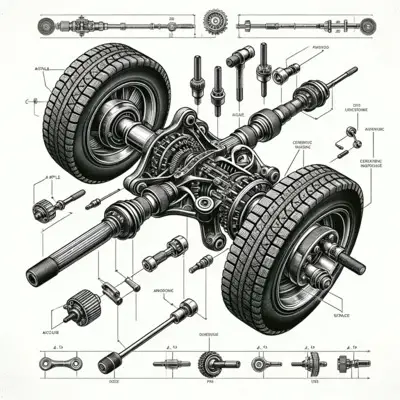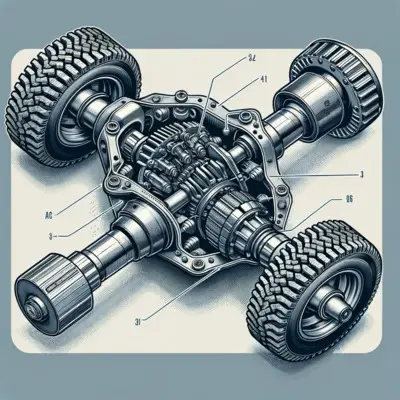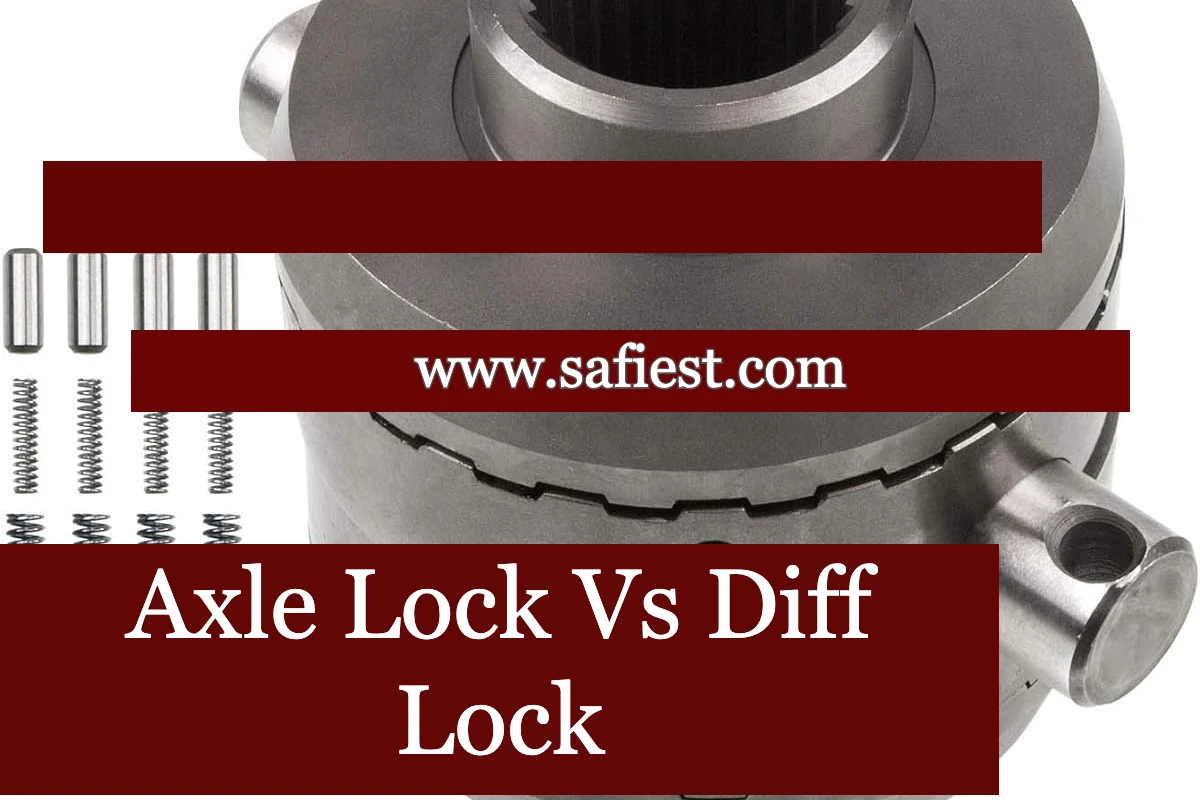The primary distinction between axle lock and differential lock lies in their operation. Axle lock, often called a locker, synchronizes the rotation of both wheels on a single axle. This ensures equal power distribution, particularly beneficial in uneven off-road terrains. Differential lock, or diff lock, connects two axles, making all four wheels rotate at the same speed. It’s crucial for maintaining traction in challenging driving conditions.
While both systems enhance off-road capability, they serve different purposes. Axle locks are ideal for situations where one wheel may lose traction, such as in mud or over rocks. Differential locks are more suited for consistently low-traction environments, like snow or sand. Understanding their distinct roles helps drivers maximize vehicle performance in various off-road scenarios.
Axle Lock Vs Diff Lock In a Table
| Feature | Axle Lock (Locker) | Differential Lock (Diff Lock) |
| Function | Can be automatic or manual, depending on the vehicle | Connects two axles, making all four wheels turn at the same speed |
| Purpose | Equalizes wheel speed on one axle | Ensures uniform wheel speed across both axles |
| Ideal For | Uneven off-road conditions like mud or rocks | Low-traction environments like snow or sand |
| Operation | Activated as needed, usually manually | Can be automatic or manual, depending on vehicle |
| Benefit | Prevents one wheel from spinning freely | Provides maximum traction in challenging conditions |
| Usage | Off-road scenarios with uneven traction | Off-road scenarios requiring consistent traction |
What Is Axle Lock?

Axle lock, also known as a locker, is an off-road feature. It locks both wheels on an axle together. This action forces both wheels to rotate at the same speed. It’s particularly useful in uneven terrain like mud or rocks.
When activated, the axle lock prevents one wheel from spinning freely. This is crucial when one wheel loses traction. The other wheel, still gripping, continues to propel the vehicle. This ensures better control and stability in challenging conditions.
Axle locks can be either automatic or manual, depending on the vehicle. Automatic lockers engage when they detect wheel speed differences. Manual lockers are controlled by the driver, usually via a switch.
They are commonly used in off-road vehicles and 4×4 trucks. Axle locks are not recommended for regular road use. This is because they can cause tire wear and handling issues.
Axle locks are essential for serious off-roaders. They provide enhanced traction and control in difficult terrains.
Pros
- Enhances traction in off-road conditions
- Improves vehicle control on uneven terrain
- Prevents wheel spin on slippery surfaces
- Can be manually or automatically engaged
Cons
- This may lead to handling difficulties on regular roads
- Requires driver expertise to operate effectively
What Is Diff Lock?

A differential lock, commonly known as a diff lock, is a feature found in many off-road and 4×4 vehicles. It serves to lock the differential, ensuring both axles rotate at the same speed. This mechanism is crucial in maintaining traction in challenging driving conditions, such as on slippery, uneven, or soft surfaces.
Diff lock is particularly effective in environments where wheel slip is likely, such as mud, snow, or sand. Locking the axles, prevents one wheel with less traction from spinning freely, ensuring that all wheels receive equal power. This distributes the engine’s torque evenly across all wheels, enhancing the vehicle’s ability to navigate difficult terrains.
Vehicles equipped with a diff lock can toggle this feature as needed. It’s often activated via a switch or lever inside the vehicle. While some vehicles may have automatic diff locks, others require manual engagement by the driver.
Diff locks are essential for off-road enthusiasts and professionals who regularly tackle challenging terrains. However, they are not recommended for use on regular roads. Using diff locks on hard surfaces can lead to tire wear and handling issues, as it restricts the differential’s ability to allow the wheels to rotate at different speeds when turning.
A differential-lock is a key feature for off-roading, providing enhanced traction and stability in tough driving conditions. It’s an invaluable tool for drivers needing to navigate through environments where standard vehicle traction would be inadequate.
Pros
- Enhances traction on slippery surfaces
- Evenly distributes power across all wheels
- Improves vehicle stability in off-road conditions
- Essential for navigating challenging terrains
Cons
- Not suitable for regular road use
- Can cause tire and drivetrain wear
- Requires driver awareness for effective use
Axle Lock Vs Diff Lock: Price
Axle locks typically cost between a few hundred to over a thousand dollars for aftermarket models. The price varies based on type (manual or automatic) and brand. Adding professional installation can significantly increase the total cost.
Differential locks also range from several hundred to over a thousand dollars for aftermarket versions. The total expense, including professional installation, depends on the vehicle model and the complexity of the installation. Factory-installed options for both are generally more expensive but offer better integration.
Axle Lock Vs Diff Lock: Durability
Axle locks are highly durable and designed to withstand rough off-road conditions. However, their longevity can be compromised by extreme or improper use. Regular maintenance enhances their durability.
Differential locks also exhibit strong durability, especially in 4×4 vehicles. Their lifespan is similarly affected by usage intensity and maintenance. Careful operation and upkeep are crucial for their long-term functionality.
Final Words
Axle locks come in automatic and manual varieties, offering flexibility. Manual lockers provide driver control, automatic ones engage when needed. Differential locks can also be automatic or manually operated. Their usage depends on the vehicle’s design and driver preference.
Cost-wise, axle and differential locks vary, depending on type, and brand. Aftermarket options range from hundreds to over a thousand dollars. Professional installation adds to the cost, factory options integrate better. Both types are investments for serious off-roaders, enhancing vehicle capabilities.
In terms of durability, both locks are designed for longevity. Their lifespan is influenced by usage intensity and maintenance practices. Regular checks and responsible usage ensure their optimal performance over time. They are robust components, made for challenging driving conditions.
Axle and diff locks are crucial for off-roading. Axle locks equalize wheel speed on one axle, diff locks connect axles. Both improve traction and control in tough terrains significantly. Their choice depends on specific off-roading needs and vehicle compatibility.
More differences:
